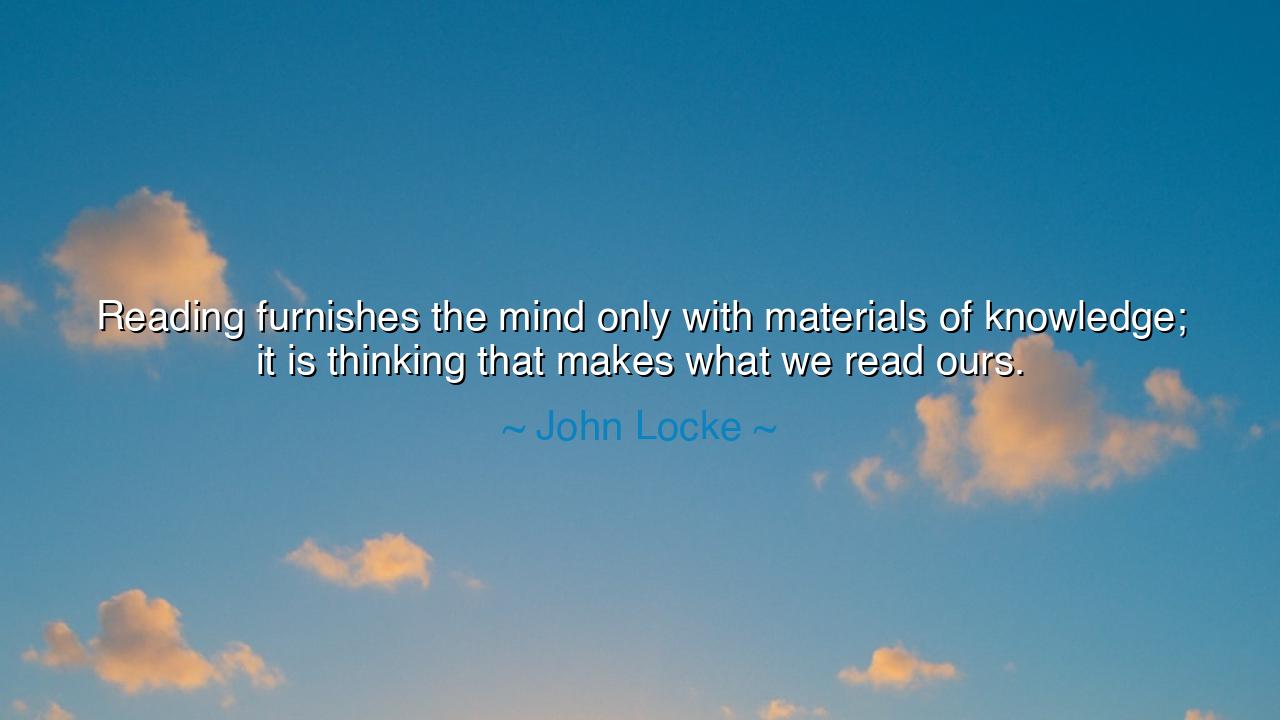
Reading furnishes the mind only with materials of knowledge; it
Reading furnishes the mind only with materials of knowledge; it is thinking that makes what we read ours.






“Reading furnishes the mind only with materials of knowledge; it is thinking that makes what we read ours.” — John Locke
Hear these words, O seeker of wisdom, from John Locke, the great philosopher of reason and enlightenment. In this saying, he speaks not merely of books and learning, but of the sacred labor of the mind. Reading, he says, is the gathering of stones — but thinking is the building of the temple. The written word can give us knowledge, but only through reflection does that knowledge take root and become our own. For what use is a library full of wisdom if the soul that reads does not awaken to understand? Locke reminds us that learning is not a passive act — it is a fire kindled by thought.
The origin of these words lies in Locke’s reflections on education and the growth of understanding. Living in the age of reason, he sought to free humanity from blind obedience to tradition and rote memorization. He saw students filling their minds with the thoughts of others, yet failing to question, connect, or transform those thoughts into insight. To him, knowledge was not a treasure to be hoarded, but a living stream to be absorbed and renewed through the power of thinking. He taught that reading without reflection leaves the mind like a storehouse of unshaped material — full, but useless. Only through thought does the raw ore of learning become the refined gold of wisdom.
For reading gathers facts, but thinking gives them form. Reading tells us what others have seen; thinking helps us see for ourselves. To read without reflection is to gaze at the stars and never learn their patterns. To think upon what we read is to chart the heavens. Many devour books, yet remain ignorant; others read little, but through deep contemplation, understand much. It is not the number of pages that enlarges the mind, but the depth of thought they inspire. Thus, Locke’s wisdom is a call not to read more, but to read better — to dwell with the written word until it becomes a living truth within us.
Consider, O listener, the tale of Isaac Newton, the great mind of science. He studied the writings of Kepler, Galileo, and Descartes — the thoughts of giants before him. Yet he did not stop at their words. He pondered them, questioned them, wrestled with them in solitude, until from their foundations he built something greater. When an apple fell from a tree, it was not mere reading, but thinking, that allowed Newton to see in that humble moment the law that governs the heavens. Had he read without reflection, he would have remained a student of others; by thinking deeply, he became a master of his own discovery.
And so it is in every age. Many can recite the wisdom of philosophers, poets, and prophets — but few can live it. The one who merely repeats the words of the wise is like a parrot who sings in the dark; the one who reflects upon them becomes wise himself, a light to others. True learning demands stillness of spirit and the courage to ask, What does this mean for me? How does it shape my life, my choices, my being? Knowledge that is not made one’s own is like a meal uneaten — nourishing in potential, but wasted in practice.
The lesson is thus: do not rush through books as a traveler hurries through cities, seeing everything and knowing nothing. Read with care, and think deeply upon what you read. Let the words of others awaken your own thoughts. After reading, close the book, sit in silence, and let your mind work as the potter’s hands — shaping, questioning, and forming. Ask yourself not merely, “What did I learn?” but “What do I understand?” For in that moment of reflection, knowledge becomes wisdom, and the words of another become the voice of your own insight.
So remember, O child of reason and wonder, that reading furnishes the mind, but thinking makes it your own. Do not be a collector of other men’s thoughts — be a creator of your own understanding. Let every book be a spark that ignites your reason, every idea a seed that grows through contemplation. Read to awaken, not to escape. Think, and what you have read will become part of your soul, inseparable from who you are. For the mind that reads without thinking is a mirror that reflects; the mind that thinks upon its reading is a flame that illuminates — and that, said Locke, is the mark of true enlightenment.






AAdministratorAdministrator
Welcome, honored guests. Please leave a comment, we will respond soon